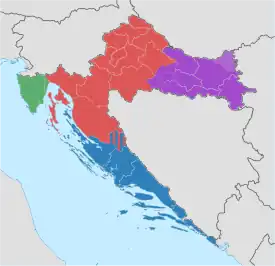Šibenik-Knin County
Šibensko-kninska županija | |
|---|---|
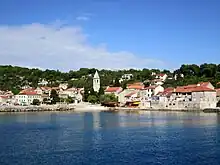 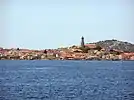     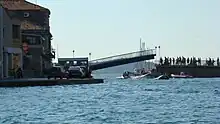   | |
 Flag  Coat of arms | |
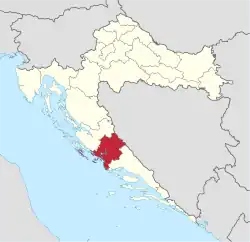 Šibenik-Knin County within Croatia | |
| Country | |
| County seat | Šibenik |
| Government | |
| • Župan | Marko Jelić (Ind.) |
| • County Assembly | 37 members |
| Area | |
| • Total | 2,984 km2 (1,152 sq mi) |
| Population (2021)[2] | |
| • Total | 98,460 |
| • Density | 33/km2 (85/sq mi) |
| Area code | 022 |
| ISO 3166 code | HR-15 |
| HDI (2019) | 0.826[3] very high · 10th |
| Website | www |
Šibenik-Knin County (pronounced [ʃîbeniːk-knîːn]; Croatian: Šibensko-kninska županija [ʃîbensko-knîːnskaː ʒupǎnija]) is a county in southern Croatia, located in the north-central part of Dalmatia. The biggest city in the county is Šibenik, which also serves as county seat. Other notable towns in the county are Knin, Vodice, Drniš and Skradin.
The county covers 2984 km2. It includes 242 islands and national parks, Krka and Kornati.
Administrative division
Šibenik-Knin county is administratively subdivided into:
- City of Šibenik (county seat)
- City of Knin
- Town of Drniš
- Town of Skradin
- Town of Vodice
- Municipality of Biskupija
- Municipality of Civljane
- Municipality of Ervenik
- Municipality of Kijevo
- Municipality of Kistanje
- Municipality of Murter-Kornati — Murter, the capital of the municipality
- Municipality of Pirovac
- Municipality of Primošten
- Municipality of Promina — Oklaj, the capital of the municipality
- Municipality of Rogoznica
- Municipality of Ružić — Gradac, the capital of the municipality
- Municipality of Tisno
- Municipality of Unešić
- Municipality of Bilice
- Municipality of Tribunj — founded in 2006, separated from Vodice
County government
As of 2021, the Župan is Marko Jelić (Ind.),[4] and the county assembly's 37 representatives are affiliated as follows:[5]
| Political party | Seats won | Government |
|---|---|---|
| Croatian Democratic Union | 14 / 37 |
Opposition |
| Independent List Stipe Petrina | 7 / 37 |
Government |
| List of a group of voters Marko Jelić | 6 / 37 |
Government |
| Social Democratic Party of Croatia | 3 / 37 |
Government |
| Most | 2 / 37 |
Government |
| Independent Democratic Serb Party | 2 / 37 |
Government |
| Croatian Sovereignists | 2 / 37 |
Opposition |
| Homeland Movement | 1 / 37 |
Government |
Demographics
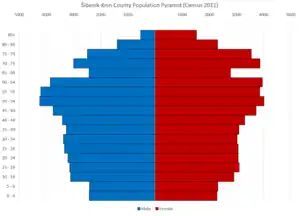
|
| ||||||||||||||||||||||||||||||||||||||||||||||||||||||
| Source: Naselja i stanovništvo Republike Hrvatske 1857–2001, Croatian Bureau of Statistics, Zagreb, 2005 | |||||||||||||||||||||||||||||||||||||||||||||||||||||||
According to the 2011 census, Šibenik-Knin County has a population of 109,375.[2] Croats make up a majority with 87.39% of the population. The Serbs are the second largest ethnic group (10,53%).[6]
| population | 85163 | 89831 | 92854 | 103302 | 118310 | 130238 | 134215 | 147166 | 148360 | 157405 | 164757 | 161199 | 152128 | 152477 | 112891 | 109375 | 96624 |
| 1857 | 1869 | 1880 | 1890 | 1900 | 1910 | 1921 | 1931 | 1948 | 1953 | 1961 | 1971 | 1981 | 1991 | 2001 | 2011 | 2021 |
In 1991, before the war, Croats were in majority, with a Serb minority of 34.2%.[7]
References
- ↑ Ostroški, Ljiljana, ed. (December 2015). Statistički ljetopis Republike Hrvatske 2015 [Statistical Yearbook of the Republic of Croatia 2015] (PDF). Statistical Yearbook of the Republic of Croatia (in Croatian and English). Vol. 47. Zagreb: Croatian Bureau of Statistics. p. 62. ISSN 1333-3305. Retrieved 27 December 2015.
- 1 2 "Population by Age and Sex, by Settlements, 2011 Census: County of Šibenik-Knin". Census of Population, Households and Dwellings 2011. Zagreb: Croatian Bureau of Statistics. December 2012.
- ↑ "Sub-national HDI - Area Database - Global Data Lab". hdi.globaldatalab.org. Retrieved 19 July 2021.
- ↑ "Župan". www.sibensko-kninska-zupanija.hr. Retrieved 20 June 2021.
- ↑ "Županijska skupština". www.sibensko-kninska-zupanija.hr. Retrieved 20 July 2021.
- ↑ "Population by Ethnicity, by Towns/Municipalities, 2011 Census: County of Šibenik-Knin". Census of Population, Households and Dwellings 2011. Zagreb: Croatian Bureau of Statistics. December 2012.
- ↑ "Creation of a Greater Serbia - Bukovica and Ravni Kotari". www.hic.hr. Archived from the original on 2016-03-03. Retrieved 2008-05-14.
External links
- Official website
 (in Croatian)
(in Croatian)
